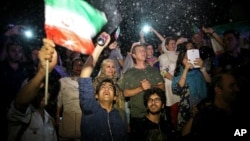In 2013, when Iran's nuclear negotiating team reached an interim deal that paved the way for this week's agreement, hard-line elements within Iran denounced them as traitors. Now, many largely are silent a day after the landmark nuclear accord with world powers — countries led by their foremost foil, the United States.
They offered little more than mild criticism as Iranians took to the streets to celebrate the historic accord. That may be because they don't want to go against the prevailing mood — and they certainly don't want to be seen as being on the same side of the argument as Israeli Prime Minister Benjamin Netanyahu, who has called the deal a mistake of "historic proportions.''
The deal, reached Tuesday in Vienna, has the potential to alter Iran's political landscape for years to come. Many political observers expect it to boost moderate President Hassan Rouhani — and perhaps even more reformist-minded candidates — ahead of the crucial parliamentary elections scheduled for February.
But that is far from certain. Iranians are hungry for relief from withering economic sanctions, and it is unclear whether the time frame Rouhani's team has agreed to will live up to expectations.
Supreme Leader's Support
Iran's supreme leader, Ayatollah Ali Khamenei, who holds the final word on all state matters, publicly backs Foreign Minister Mohammad Javad Zarif and his team. That in itself helps temper hard-line opposition.
"Zarif would have been unable to speak to Americans for five minutes without approval from Khamenei,'' prominent political analyst Saeed Leilaz said. "Reaching a deal with world powers was a decision by the country's top leadership, including Khamenei.''
At the same time, Khamenei has left the door half-open for hard-liners to engage in "constructive criticism.'' Powerful elite Revolutionary Guard commanders, who previously spoke out against concessions on Iran's nuclear ambitions, have yet to publicly react to the deal.
Leilaz said hard-liners find it extremely difficult to come out against public mood.
"Iran's hard-liners don't want to be seen as ally of Netanyahu these days,'' he said.
That opinion has echoed in the street.
"There are three groups of people in the world who are against the deal: warmongering Republicans in the U.S., Netanyahu and hard-liners in Iran,'' said Tehran resident Hossein Alizadeh.
Even before the deal, former President Akbar Hashemi Rafsanjani said hard-liners "speak Netanyahu's language.''
Newspaper's Response
The hard-line daily newspaper Kayhan also offered a muted response to the agreement, choosing to focus instead on what it saw as a sharp difference between what President Barack Obama and Rouhani said of the deal.
"A 180-degree difference of two accounts from a single agreement,'' Kayhan wrote Wednesday.
The newspaper also found itself criticized by one banner the night of the deal, which read: "Condolences to Kayhan, Israel.''
Moving forward, hard-liners will be unable to block the deal as long as Khamenei supports the negotiating team. Although the parliament has the power to undermine the accord, such action appears unlikely. The parliament's National Security and Foreign Policy Committee, which is dominated by moderate conservatives who largely support the nuclear team, has welcomed the deal.
What criticism there has been has been mild or few. Yalesarat, a hard-line magazine, described the final deal as imposing "widespread limitations'' on Iran's nuclear program. Mahdi Mohammadi, a critic of Rouhani, did not criticize the deal itself — but gave all the credit to Khamenei.
"Without the supreme leader's management and fair criticism by the elite, the [deal] had no chance to be turned into a balanced text,'' he said.
Return to Domestic Focus
But challenges remain for Rouhani. Leilaz, the analyst, said the honeymoon could end as soon as Rouhani turns his attention back to domestic issues. There, hard-liners could push back against his more moderate agenda, which includes of easing restrictions on personal freedoms.
Rouhani also could become a victim of the deal's success. Mehdi Khalaji, an analyst at the Washington Institute for Near East Policy, a U.S.-based think tank, noted that Rouhani could face a tougher time as he finds himself "caught between hard-liner suspicions and inflated public expectations.''
"The nuclear deal is a significant achievement for Rouhani, but the country's attention will now be diverted to various economic challenges and internal political disputes,'' Khalaji wrote.
Still, prominent political analyst Sadeq Zibakalam called the landmark deal a "turning point'' in Iran's modern history.
"It will bring reconciliation between the Islamic Republic of Iran and the world,'' he said. "It's the beginning of the end to 'Death to America.' ''
And reformist politician Mohammad Reza Aref, while predicting that moderates and reformists would win the February vote, said the deal brought more than political change.
"The negotiating team brought the gift of hope to the Iranian nation,'' he said.




